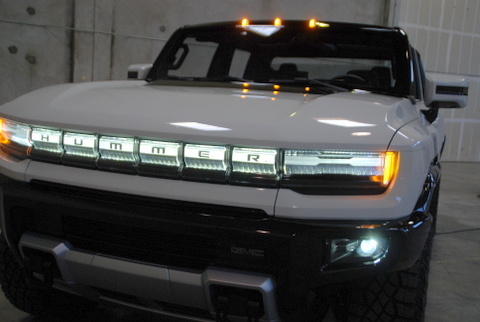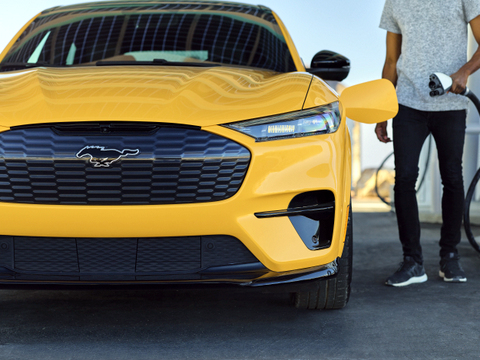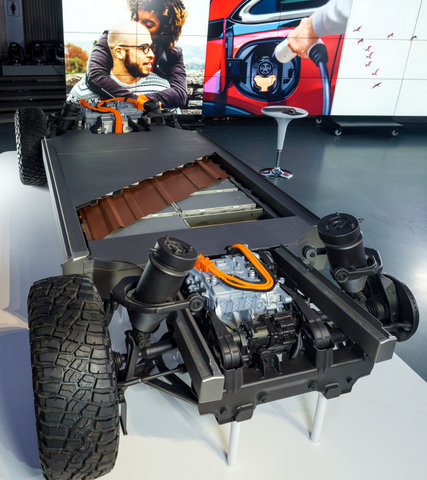GM and Biden Target 2035
[Ed. note: An additional news article on this subject can be found here.]
It was a week of good news for EVs and climate action, as General Motors and the new U.S. president announced ambitious plans to tackle global warming. Both set a goal fourteen years out, which, although it’s later than the often-cited 2030 target from the Paris Agreement, is a profound move forward.
General Motors Makes a Commitment
Years ago, Charles Wilson, President of General Motors, and Eisenhower’s nominee for Secretary of Defense, famously said, “What is good for the country is good for General Motors and vice versa.” Democrats on the committee focused on the vice versa of the statement, but in the modern case, it may actually be true either way.

When GM first stated its intention to move toward electric vehicles and rolled out its vision of Zero Crashes, Zero Emissions, and Zero Congestion, I was skeptical. After all, this is the company that makes its money on gas-guzzling pickup trucks and Chevy Tahoes and has promoted Corvettes and Camaros. But they did introduce the worthy Bolt EV and were dabbling in green tech with the plug-in hybrid Volt before that.
With Tesla in their rearview mirror (or maybe now seen through their windshield!), one of America’s “big three” has officially put their bets on electric cars and has announced their plan to have a 100% electric fleet by 2035. GM will introduce 30 new EVs by 2025, including a new all-electric Hummer! They are developing a new flexible platform and the Ultium battery, which they will produce themselves. And they are putting $27 billion on the table to do it. With their long-established cross-country dealer network and factories in America, they have a good start.
Last night, I watched a recording of GM President Mark Reuss talking with Malcolm Gladwell at CES 2021 for GM Exhibit Zero. He said all the right things and laid out GM’s plan for 30 EVs by 2025 and all the rest. GM CEO Mary Barra has been quite forthright about the company’s plans, too.
Biden Steps Forward on Climate Change Action

Meanwhile, America’s new president put forward his plan, and it’s just what many of us have been waiting for. Immediately putting the U.S. back in the Paris Agreement and cancelling the Keystone XL Pipeline were signature acts, but Biden’s announcement of moving to an all-electric fleet was an eye opener. It goes along with California’s 2035 target of no new light-duty internal combustion engine vehicles sold starting in 2035. The Golden State has been leading the charge towards lower emissions for decades. It also fits nicely into GM’s plan.
Ford Is Planning and Releasing EVs, too
Ford is investing more than $11.5 billion in electric vehicles through 2022, and zero-emission versions of some of its most popular nameplates are on the way, including the Mustang Mach-E, which starts arriving in dealerships this year, as well as a Transit Commercial EV and fully electric F-150 coming within 24 months.
The company previously announced its plan to use 100-percent locally sourced renewable energy for all its manufacturing plants globally by 2035. That means energy would come only from sources that naturally replenish – such as hydropower, geothermal, wind or solar.

However, as builders of America’s favorite vehicle for more than four decades, the F-150 pickup, they can have a big impact by putting an electric motor under its tall hood. And, leveraging the reputation of their most iconic vehicle, the Mustang, they have just introduced the category-bending, all new Mustang Mach-E, an all-electric four-door crossover that has the Tesla Model Y in its sights (with a heavy dash of Mustang traditional styling and performance). If these two pillars of Ford’s product line move the sales needle, Ford will be making an impact, too, and can start introducing more electrified vehicles.
It’s easy to see America’s two surviving American-owned car companies jumping in and writing big orders for all those electrified U.S. government fleet vehicles and making those American factories hum with green-tech jobs. It has win-win written all over it. Of course, making this huge transition will not be easy or instant, but the overwhelming weight of scientific evidence tells us we must do it now.

When Mark Reuss answered Malcolm Gladwell’s question, “Why now?” during the interview, he said it was because it was the right thing to do, and that he wanted a safe, healthy world for his three grandchildren. As a grandparent myself, I wholeheartedly agree.
Bold initiatives by corporations, states and national governments have proven effective in Europe and China, and now the U.S., under new leadership and in cooperation with its auto manufacturers, is approaching the EV tipping point. I have more faith now that we can and will make this happen. In the middle of the next decade, it will all seem like it was meant to be, and once-skeptical buyers will be sold on the new, cleaner, better technology. For now, I’m doing whatever I can to push us to and beyond the EV tipping point.
Story by Steve Schaefer; photos from Clean Fleet Report archives. This also appeared on SteveGoesGreen.
Related Stories You Might Enjoy—GM & Ford’s EV Moves
News: General Motors Makes Big Electric Vehicle Moves
Verge: General Motors Ramps Up Renewable Energy in its Plants
News: GM Commits to 12 Upcoming EVS
News: GM Accelerates Toward EV Future
News: General Motors Working on 32 Plug-in Hybrid & Electric Cars
Flash Drive: 2021 Ford Mustang Mach-E Electric Crossover
News: Ford Introduces E-Transit Commercial EV

8 thoughts on “Opinion: Moving Closer to the EV Tipping Point”